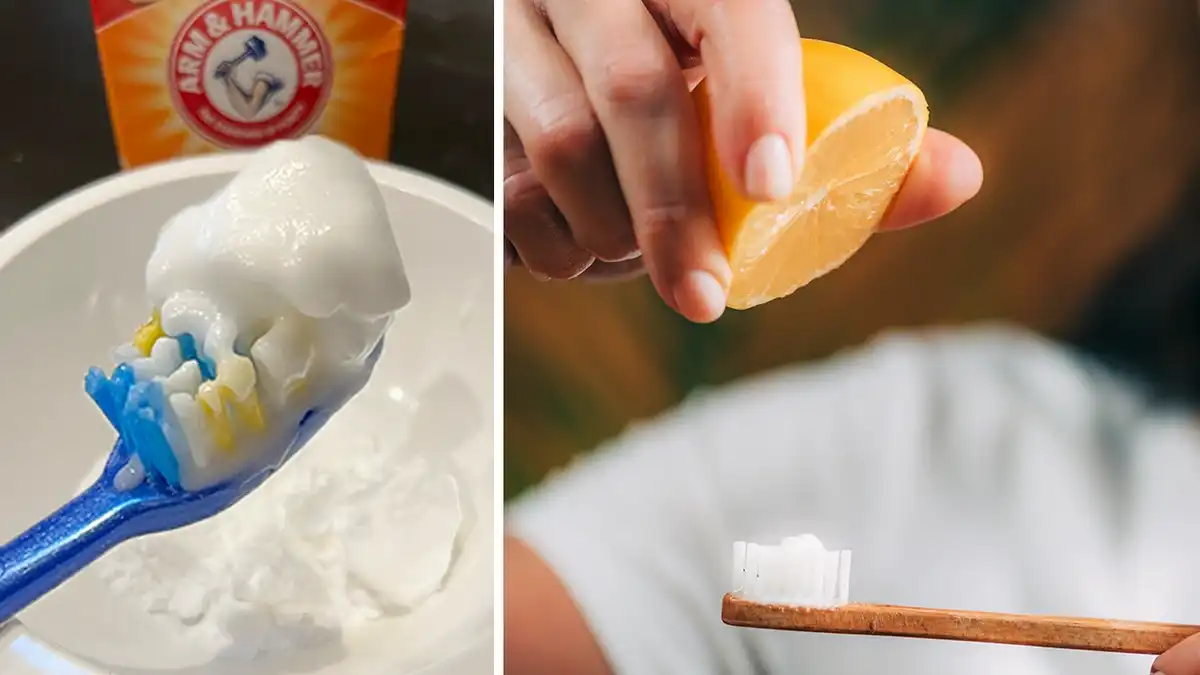The Truth About Whitening Teeth With Baking Soda


First of all, baking soda (sodium bicarbonate) is still a bit controversial when it comes to using it on your teeth! It’s still being talked about in the dental world with lots of different views… Some dental professionals will tell you to never use baking soda on your teeth because it’s too abrasive. However, the more updated frame of thought (with new abrasivity charts) is that it’s actually not that abrasive and it actually might be safe on your teeth!
Shop: I’ve been using Vacay Whitening Strips because they work—without the sensitivity.
Hydrogen Peroxide Whitens Teeth Not Baking Soda
But, first, if we’re talking about baking soda for teeth whitening, it’s important to understand that baking soda can’t WHITEN teeth because peroxide is what whitens teeth. Many whitening products use hydrogen peroxide or carbamide peroxide to whiten teeth. Baking soda may help reduce the formation of tooth stains, but it can’t actually whiten teeth (the same goes for whitening toothpastes).
To effectively whiten your teeth, you’d need to use actual teeth whitening products (such as whitening strips, whitening trays, professional whitening gels, etc) because they are formulated with peroxide to penetrate and oxidize the stain particles inside of your tooth, physically making your teeth shades whiter.
Related: Best Teeth Whitening Products
Baking Soda Toothpaste
Also, there are a ton of articles online promoting how to make baking soda toothpaste at home with things like lemon juice. DO NOT make homemade baking soda with lemon juice. Lemon juice is super acidic and will damage tooth enamel.
I know the argument is that baking soda straight from the baking soda container is cheaper than using a baking soda formulated toothpaste. But, it’s only cheaper because it’s not toothpaste! The homemade baking soda paste is not formulated for the purpose of brushing your teeth with it!
To prevent cavities, you can’t just brush with baking soda straight from the container. You also need to brush with a cavity prevention toothpaste, as well. So, my argument is…if you want to use baking soda, why not just use a toothpaste where it’s already formulated with both cavity-prevention AND baking soda? Or any type of whitening toothpaste?! They even make whitening toothpaste for sensitive teeth.
Related: Best Toothpaste for Sensitive Teeth
Does Baking Soda Whiten Teeth?
In all, if you are eager to use baking soda, it’s recommended to find a baking soda toothpaste (so it’s also formulated with the anti-cavity ingredients). Also, don’t forget that baking soda can’t whiten teeth – it can only help reduce stains from forming.
Whether or not you’re using a baking soda toothpaste, it’s more important to make sure that (1) you’re using proper brushing techniques to remove plaque and debris from your teeth twice each day and (2) you’re using a cavity prevention toothpaste with fluoride or hydroxyapatite twice each day for cavity prevention.

Make your inbox smile!
Subscribe






